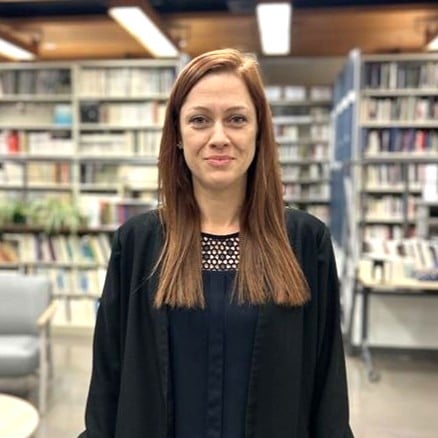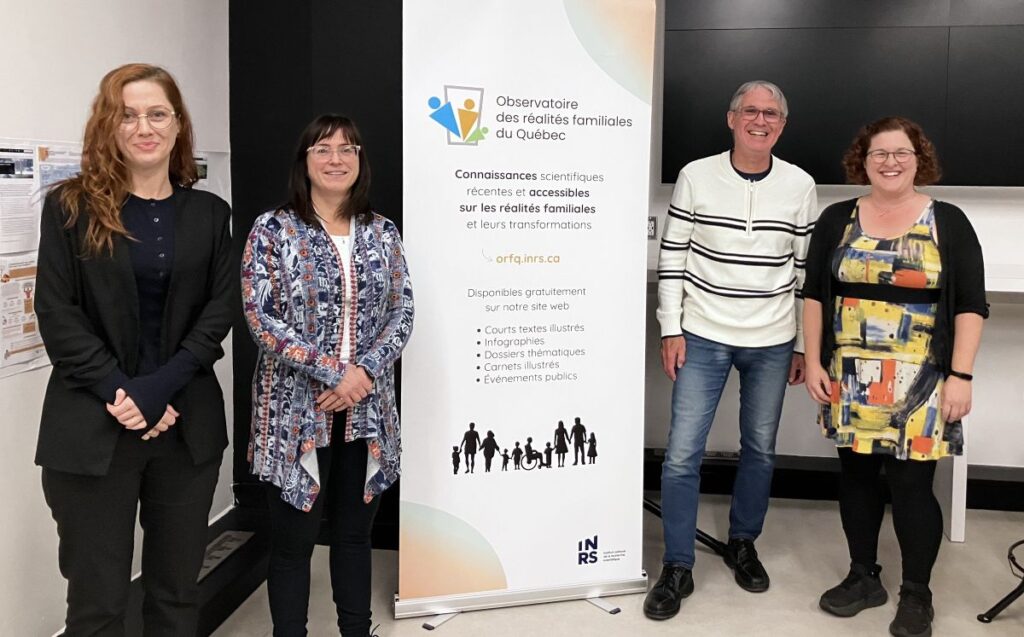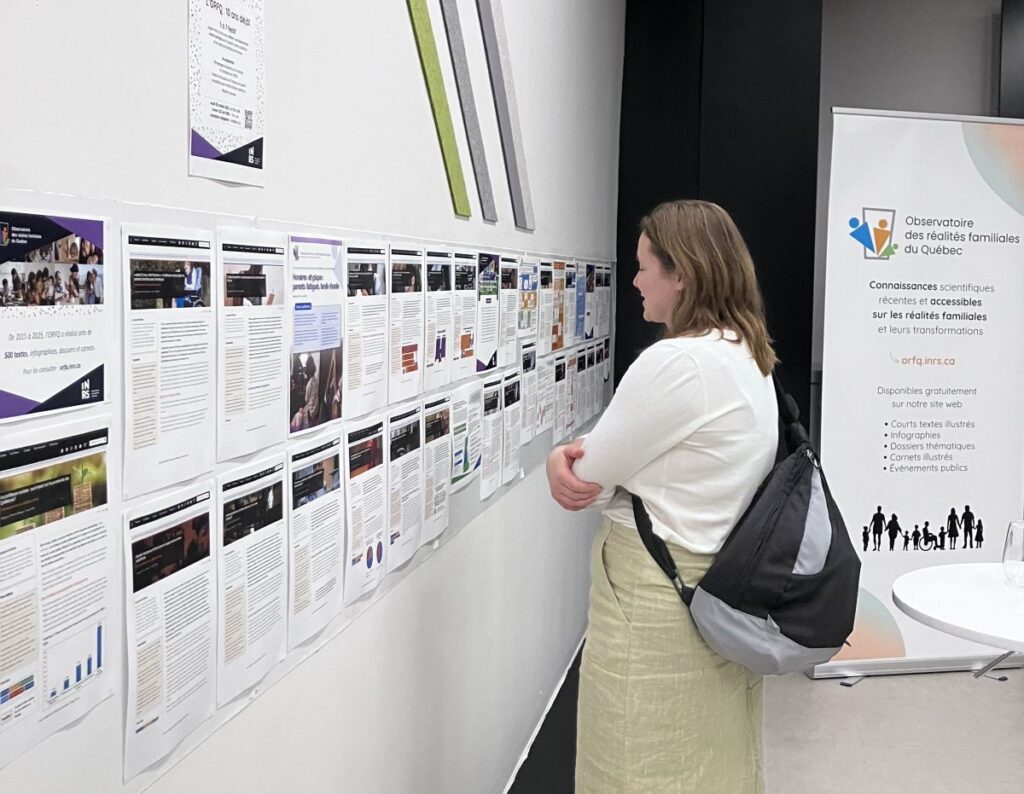- Research
The Observatoire des réalités familiales du Québec marks a decade dedicated to sharing knowledge.

The Observatoire des réalités familiales du Québec (ORFQ), which is affiliated with the Institut national de la recherche scientifique, was created in 2015 with a mandate to disseminate research findings on changing family realities in Quebec in an accessible language.
The realities that ORFQ has shone a light on since its inception include blended families, adoption, work-family balance, conjugal violence, immigration, sexual and gender diversity, and the perinatal period.
A look back at 10 years of accessible research with ORFQ Director, Professor Maude Pugliese, an expert on issues of family, finances and inequalities based at INRS’s Urbanisation Culture Société Research Centre, and with Marilyne Chevrier, ORFQ general coordinator and knowledge mobilization lead.
In your view, what distinguishes ORFQ from other family-sector research organizations?

Maude Pugliese (M.P.): What sets us apart is that we’re not, properly speaking, a research organization. At least not if you think of research as involving the production of new scientific data. Instead, ORFQ is a documentation and dissemination space for knowledge that’s already available. We’re an interface between different communities of practice that have an interest in family issues. In this regard, ORFQ consolidates recent research, including scientific articles, research reports and doctoral theses, for purposes of translating all the related information into accessible formats. We favour short formats with no jargon, therefore. At the outset, ORFQ’s core focus was on drafting review articles, but in recent years our team has also begun developing dynamic illustrated content. We publish a minimum of 30 documents per year, together with infographic content, thematic dossiers, and a monthly newsletter. As a result, we’re highly responsive to current issues of timely importance.
Marilyne Chevrier (M. C.): The fact that we’re not a traditional research entity also means that we’re not required to disseminate research by any specific research group. We can draw from a range of research findings available in Quebec, and sometimes in Canada and beyond. This independence is a major strength. Each year, tens of thousands of people from all across Quebec and La Francophonie view ORFQ content. This shared knowledge serves to inform collective actions taken with families.
How does ORFQ select its subjects and orientations?

M.P.: ORFQ has a nine-partner advisory committee, and all the partners are major family-sector stakeholders and organizations in Quebec. We consult these organizations to take the pulse of the community: What are the most pressing family realities that require new knowledge? What are the concerns among professionals in the field? These partners act as guiding forces for our organization. The community-based family services sector accounts for one of our largest audiences. Our goal is to provide these entities with relevant updated information, drawing from research on subjects of interest to them, for which there is an obvious lack of knowledge. A good example would be the realities specific to immigrant families or access to social services for families in vulnerable situations.
M.C.: Family realities and social contexts change fast, and family living conditions have deteriorated… There’s much that has to be done. Our partners allow us to map out a direction in an effort to meet the direct needs observed in the daily lives of families. In response to the needs set out by its advisory committee, ORFQ can also build thematic dossiers meant to spark reflection and inform the general public. The most recent dossiers concerned multiparenting, but also the realities specific to transgender and non-binary youth and their families.
ORFQ is also taking a closer look at emerging and regional family realities, in fact. What role does ORFQ play in these understudied fields?
M.P.: Some emerging realities – for example multiparenting – are important issues for actors on the ground, but what we see is that research in this area is still in its infancy. In regard to these timely subjects, we’re working with content that’s still being analyzed at the university level. At the same time, publication cycles, for example in scientific journals, tend to be rather slow, which presents a challenge for an ecosystem working with the population on a day-to-day basis. In these specific cases, ORFQ offers events to highlight current research findings, which our team then translates into illustrated publications. We operate outside of the usual publication frameworks, while ensuring that content is verified and created by experts in the field.
M.C.: In addition, many professionals working with families in Quebec confirmed to us that realities can vary considerably from one region to the next. That said, the research is focused more closely on population pools in Montreal, or on aggregate data for the province as a whole. Regional workers are dealing with a lack of evidence-based information.
M.P.: As a result, ORFQ has put forward a project that aims to help support them; for example, we want to encourage researchers and graduate students to study these regional aspects and take a more in-depth look at certain family realities. In this sense, ORFQ acts as an interface, connecting the needs on the ground with knowledge-producing communities.


Because of its unique model, ORFQ holds a special place in Quebec’s broader scientific community. In what way is your structure of interest to emerging scientists and the public?
M.P.: ORFQ helps train tomorrow’s scientists, not least through the trainees it takes in every year. The students say that scientific popularization skills are in demand on the job market. The training we offer at ORFQ directly strengthens cross-disciplinary competencies. It is the students who do the writing at ORFQ. Given that we’re a small team and that our student writers and trainees cover a range of different aspects, they’re able gain experience on multiple levels. Each text is re-worked with the students and submitted to several round of revision, which allows them to become rigorous, creative and effective.
M. C.: What’s more, university courses regularly refer to ORFQ as a model. Many colleagues draw inspiration from our approach when they share scientific popularization skills, in fields as varied as sociology, social work or criminology. Each year, we collaborate with professors who ask their groups to draft popularized texts based on the ORFQ method. Our senior editors then evaluate, select and oversee the best texts for eventual publication. We often receive requests from the public in Quebec, but also from France and French-speaking Africa, from people who view our online content and contact us in connection with different problems addressed in our texts. We then direct them to the appropriate resources. We can see that our content is drawing interest from outside Quebec.
M. P.: Under the current context, where we’ve observed a certain difficulty in disseminating scientific information, notably due to issues around disinformation, we’re extremely proud to say that each week, we disseminate accessible and robust knowledge backed by research. So, above and beyond university-based research, ORFQ plays a pivotal role as a knowledge broker, social showcase, and interface between communities. This role is of great relevance in today’s world.
